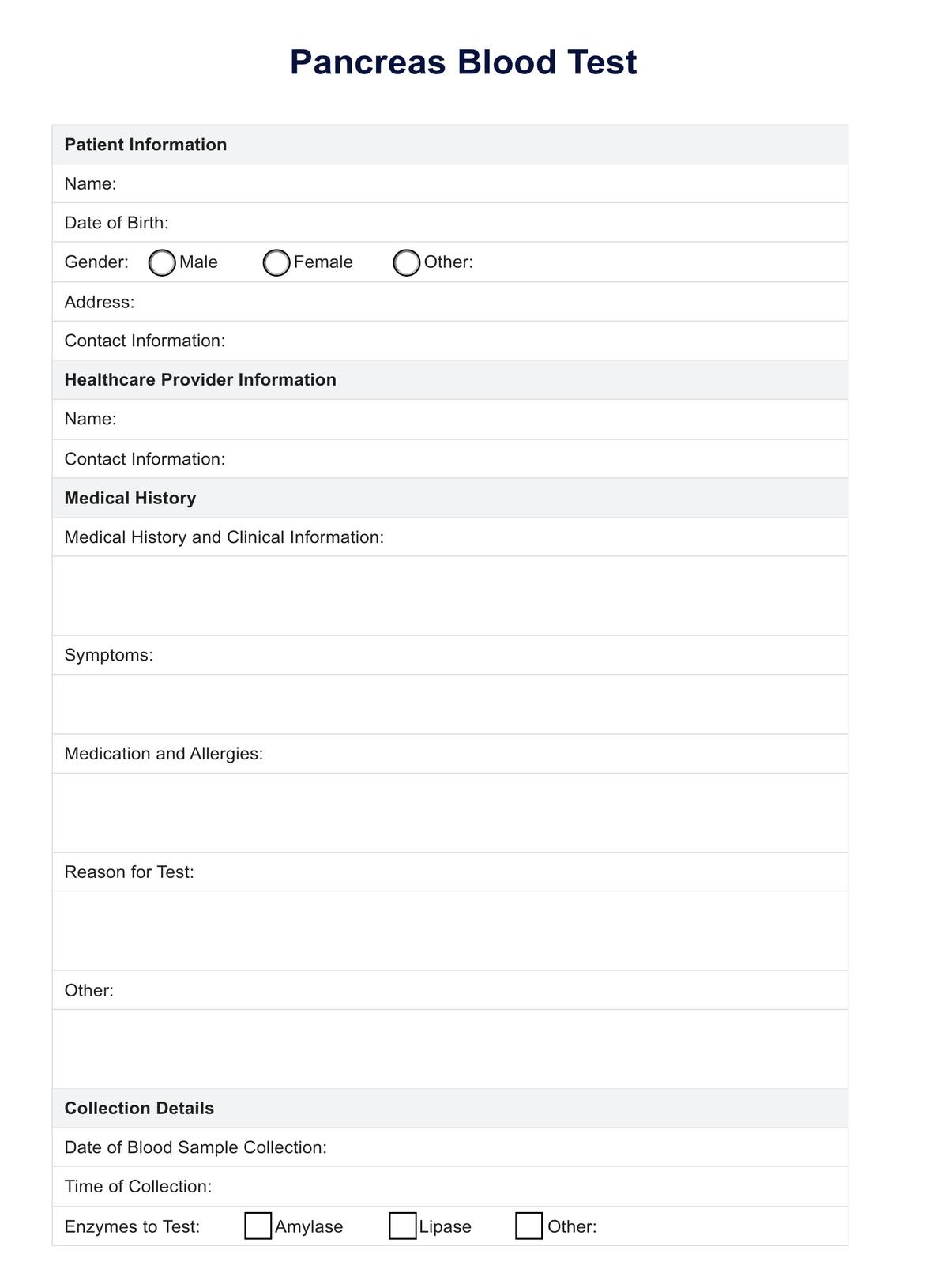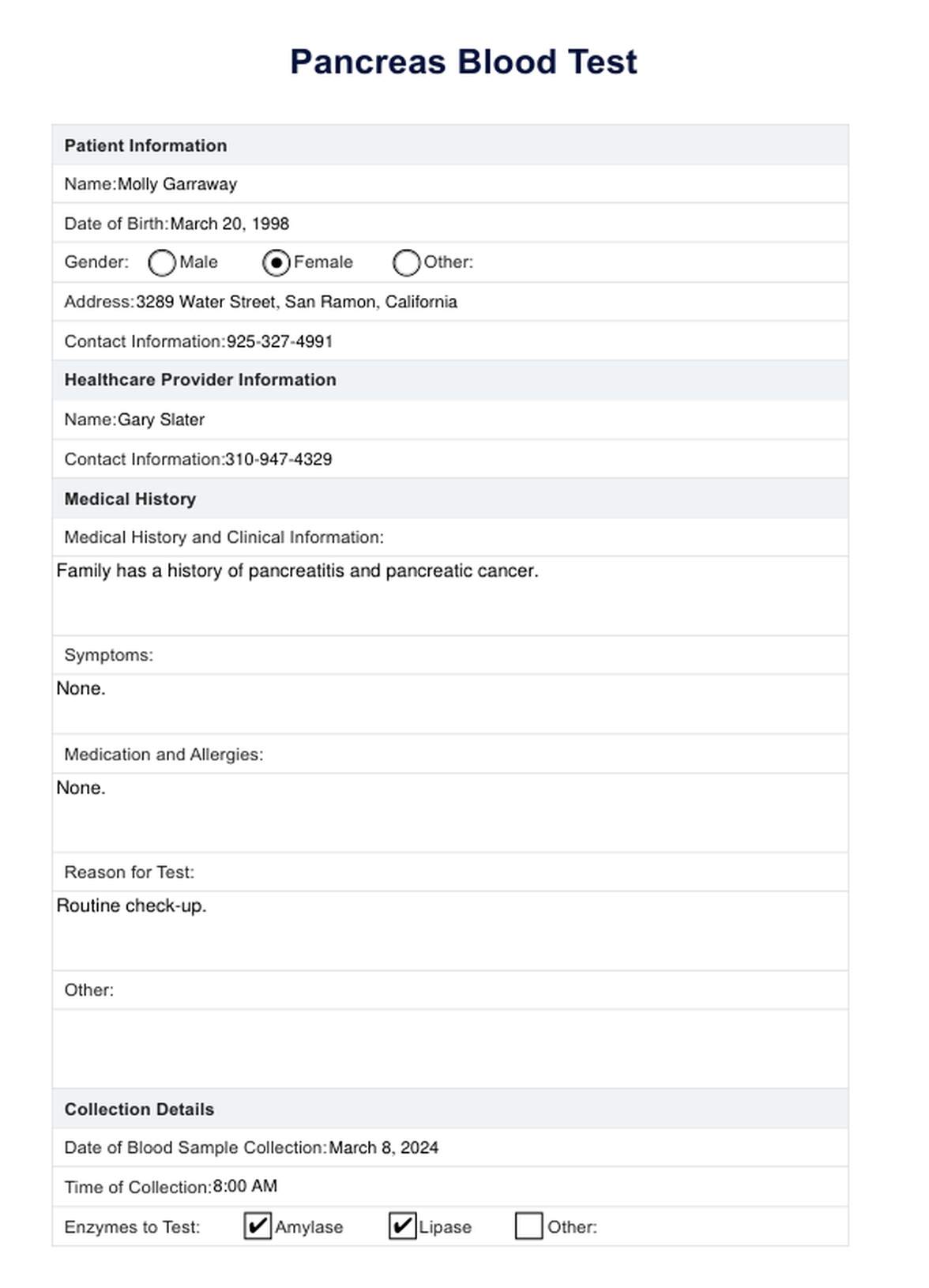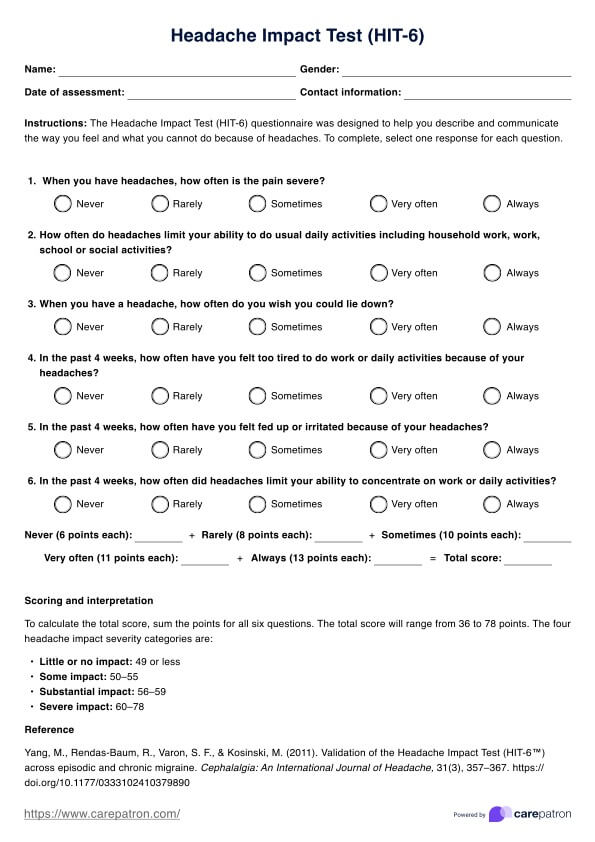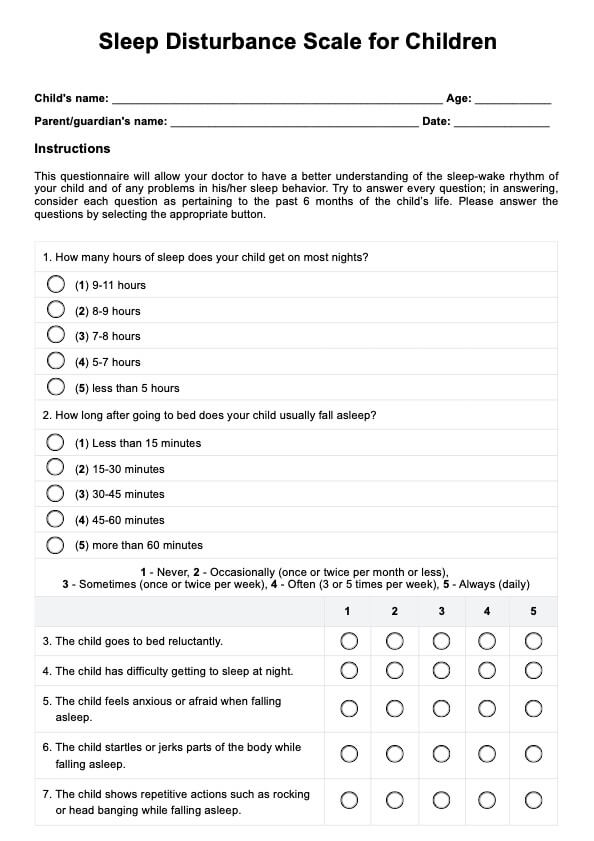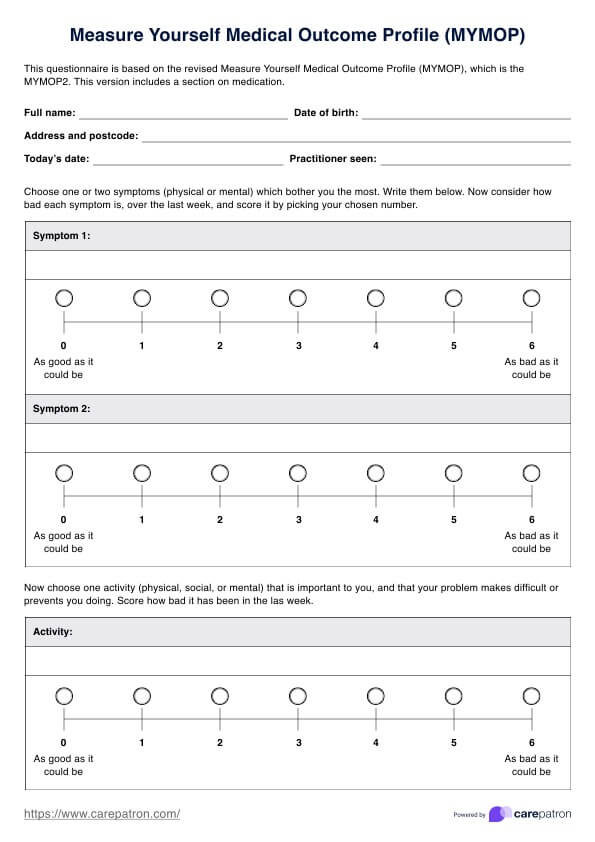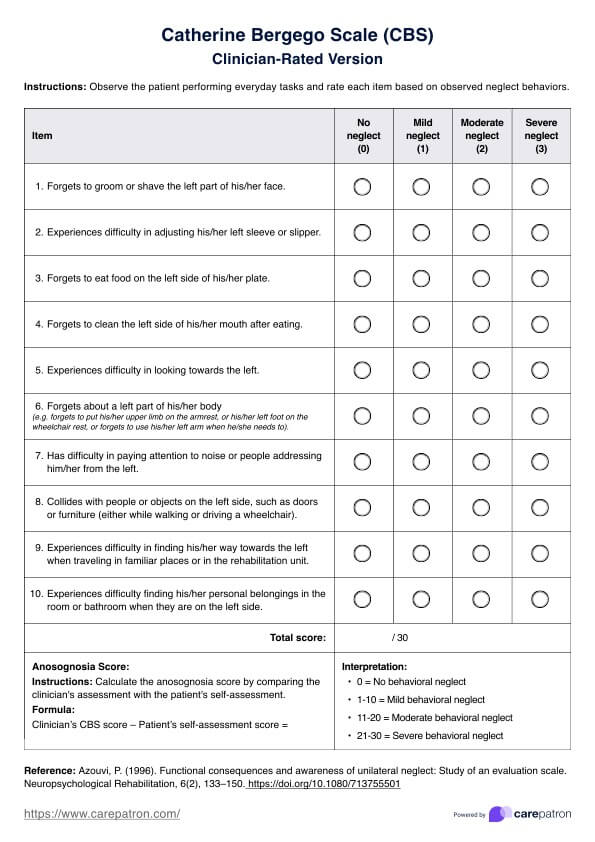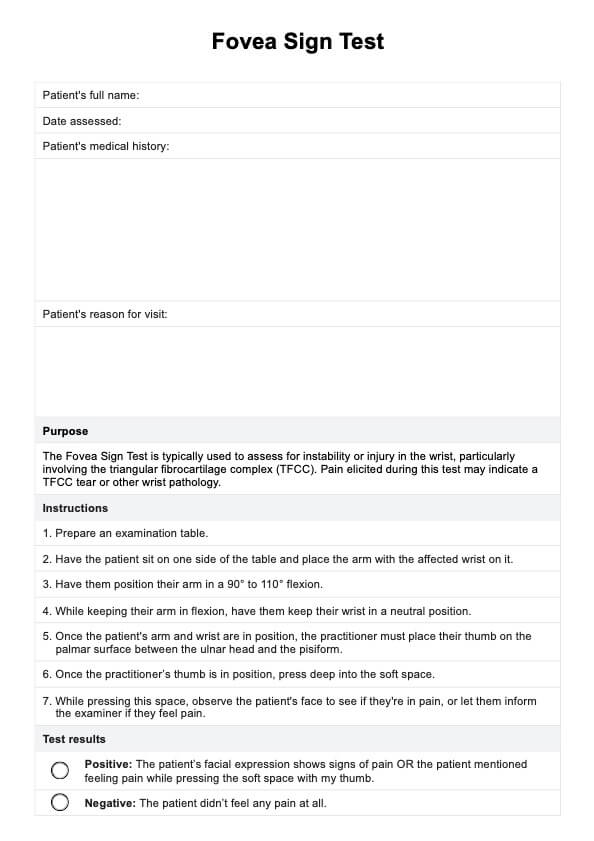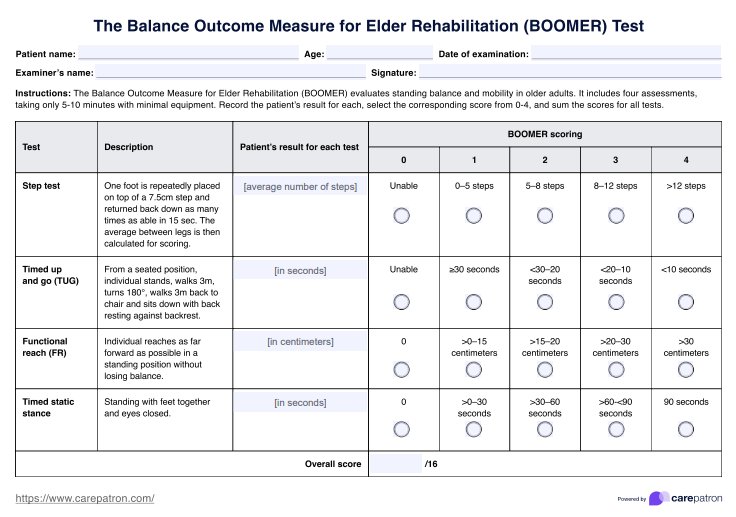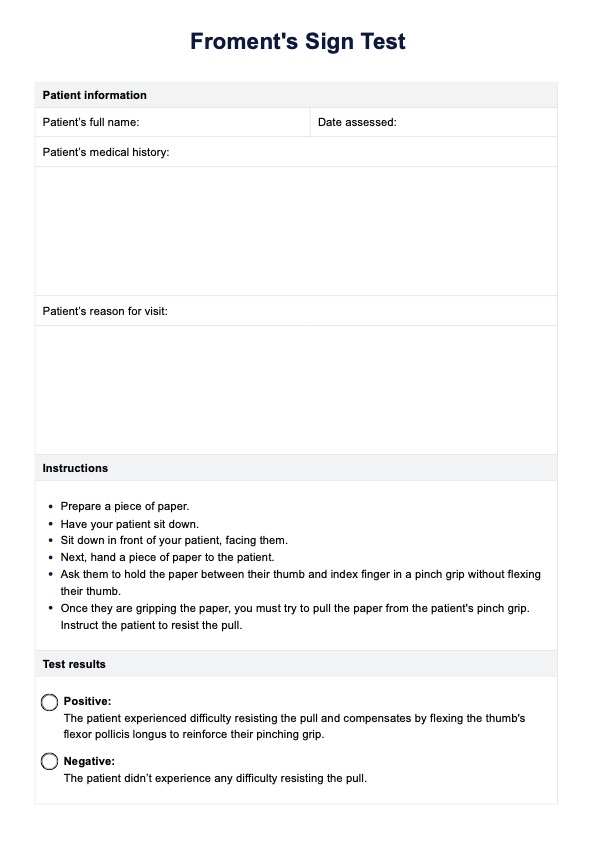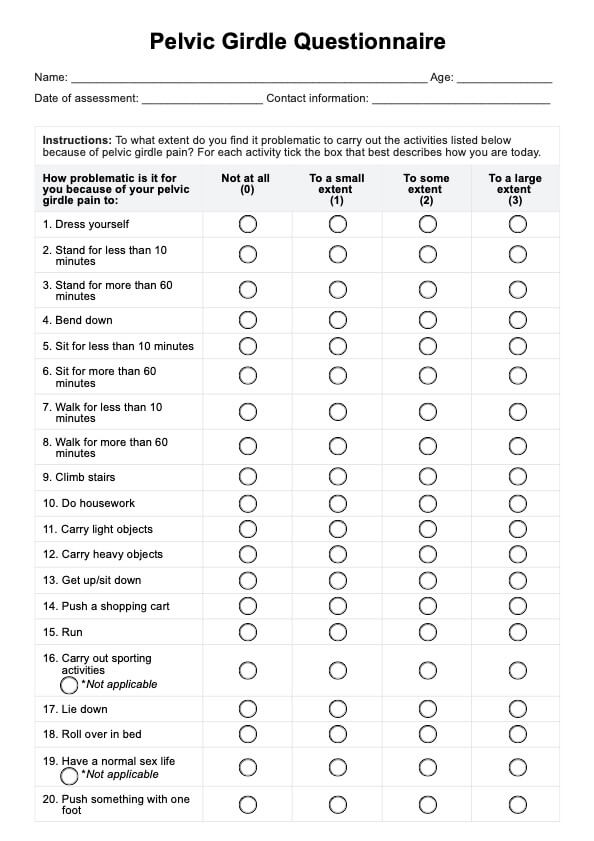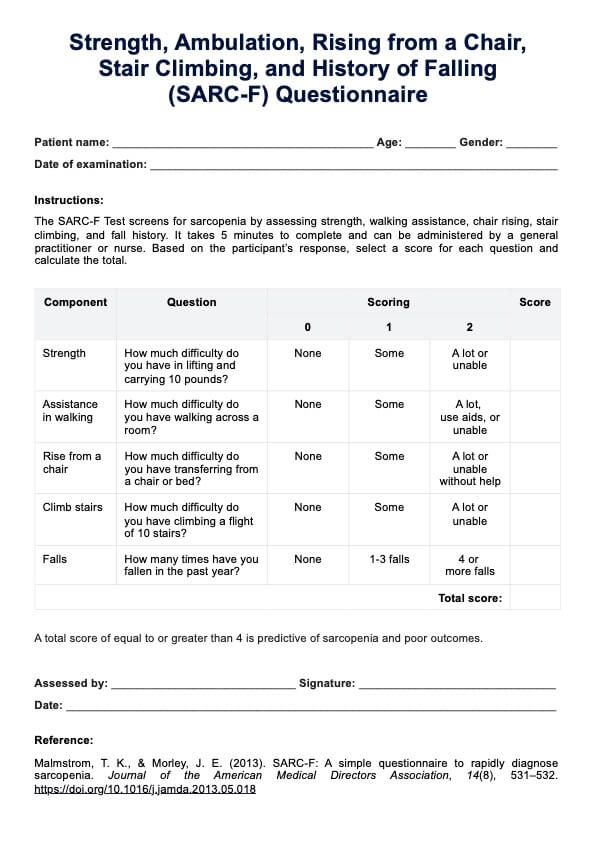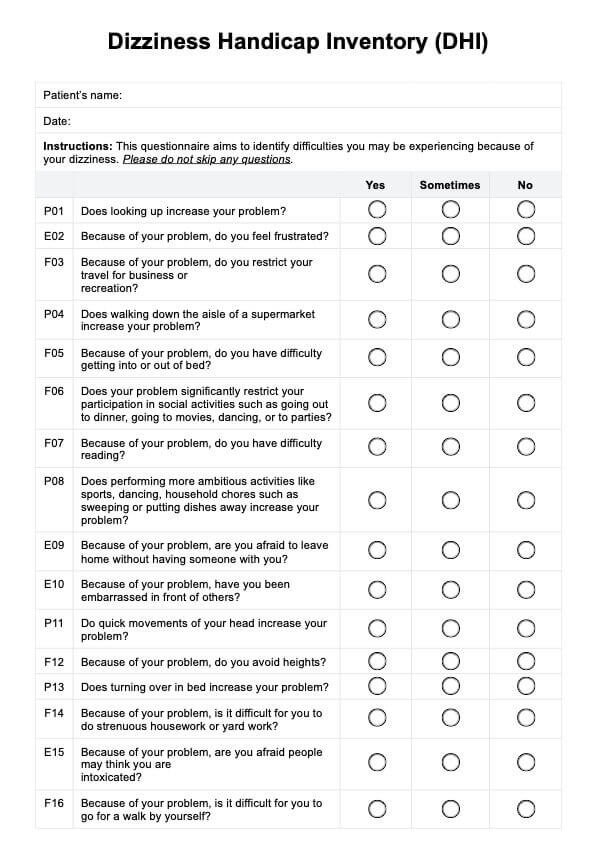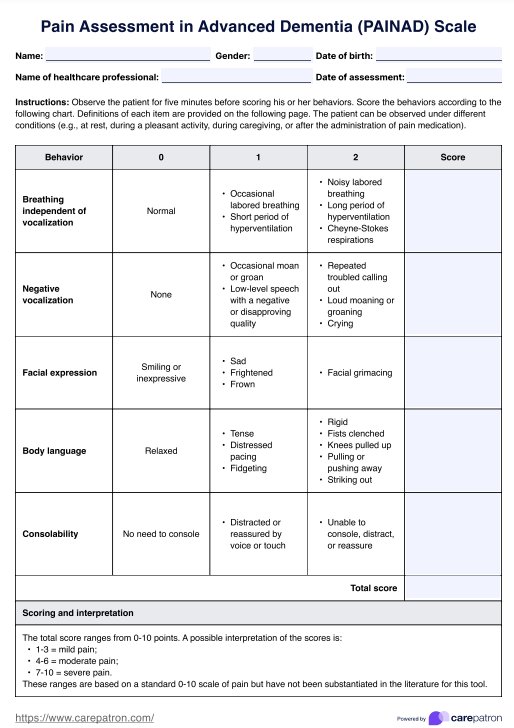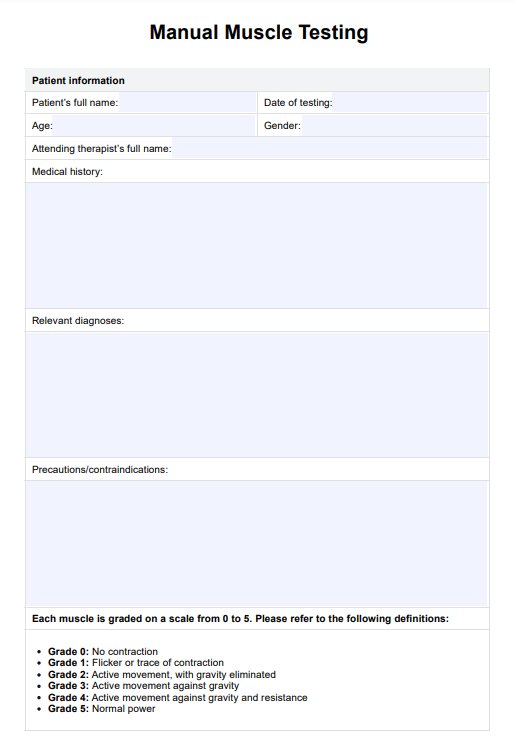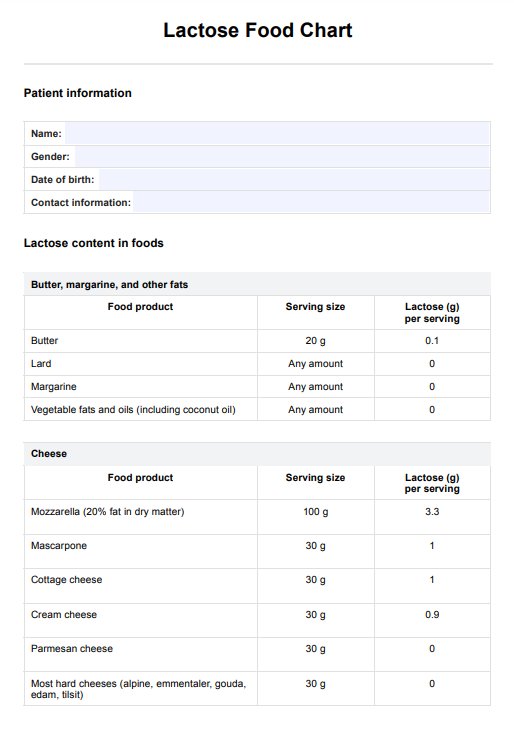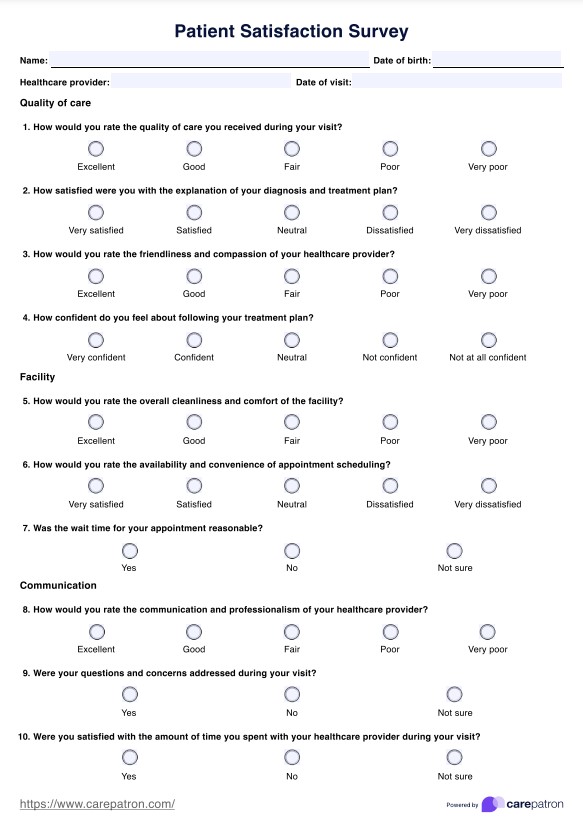Pancreas Blood Test
Learn more about the Pancreas Blood Test and obtain a template you can use to request and record the results of this assessment.


What is the pancreas?
The pancreas is a substantial gland situated posteriorly to the stomach. Primarily, its exocrine function involves the generation and secretion of crucial enzymes essential for digestion. Among these enzymes are lipase, collaborating with bile to facilitate the breakdown of fats; amylase, dedicated to the disintegration of carbohydrates to provide energy; and protease, orchestrating the decomposition of proteins.
In addition to its digestive duties, the pancreas serves a vital endocrine function by releasing hormones that meticulously regulate blood sugar levels. This hormonal orchestra includes insulin, adept at diminishing elevated blood sugar levels, and glucagon, proficient in elevating diminished blood sugar levels.
Pancreas Blood Test Template
Pancreas Blood Test Example
What is a Pancreas Blood Test?
A Pancreas Blood Test serves as a crucial diagnostic tool designed to evaluate the functionality of the pancreas. This procedure specifically quantifies the levels of essential digestive enzymes, notably amylase and lipase, present in the bloodstream.
Often, healthcare providers prescribe a Pancreas Blood Test in response to symptoms suggestive of acute pancreatitis or other pancreatic conditions such as severe abdominal pain, nausea and vomiting, loss of appetite, fever, and back pain associated with pancreatitis.
There are multiple reasons why a healthcare practitioner may require a patient to undergo a test. Some of these are:
- Diagnose pancreatic conditions: One primary purpose of the Pancreas Blood Test is to diagnose pancreatic conditions. These encompass a spectrum of ailments, including pancreatitis characterized by inflammation, pancreatic cancer, and cystic fibrosis.
- Monitor disease progression: The test is pivotal in monitoring disease progression for individuals already diagnosed with a pancreatic condition. It's a dynamic tool for assessing the efficacy of ongoing treatments, providing valuable insights into the condition's response to therapeutic interventions.
- Check for systemic diseases: The test extends its utility to encompass diseases with systemic implications. Conditions affecting the entire body, such as mumps or kidney disease, can manifest in elevated levels of pancreatic enzymes.
- Evaluate abdominal pain: Severe abdominal pain often prompts the need for a Pancreas Blood Test. This diagnostic tool plays a pivotal role in deciphering whether the origin of the pain lies within the pancreas.
What complications can this blood test point to?
A Pancreas Blood Test serves as a valuable diagnostic tool. It sheds light on various complications that may be affecting the pancreas and beyond, like the following:
- Pancreatitis: Elevated levels of digestive enzymes - amylase and lipase - detected in the bloodstream through the Pancreas Blood Test may serve as a reliable indicator of both acute and chronic pancreatitis, an inflammatory pancreas condition.
- Pancreatic cancer: The Pancreas Blood Test is helpful when diagnosing pancreatic cancer because abnormal results can act as a red flag, prompting further, more specialized diagnostic examinations.
- Cystic fibrosis: A genetic disorder with implications for the lungs and digestive system, including the pancreas, cystic fibrosis can be identified through a Pancreas Blood Test, contributing to the comprehensive diagnosis of this condition.
- Diabetes: The Pancreas Blood Test assumes significance in the context of diabetes, a condition linked to insulin production. Abnormal blood glucose levels identified through the test may indicate potential issues with insulin production, prompting consideration for further diabetes-related assessments.
- Gallstones or abscess: Beyond pancreatic conditions, a Pancreas Blood Test, when coupled with imaging tests, proves instrumental in identifying gallstones or the presence of an abscess.
- Other systemic diseases: Diseases that impact the entire body, such as mumps or digestive and kidney diseases, can manifest in elevated levels of pancreatic enzymes.
How does a Pancreas Blood Test work?
A Pancreas Blood Test functions as a meticulous diagnostic procedure, methodically gauging the levels of specific digestive enzymes originating from the pancreas within the bloodstream. The process unfolds through a systematic series of steps:
Step 1. Blood draw
Commencing the procedure, the healthcare provider meticulously cleans the skin surrounding the selected vein. Subsequently, an elastic band is applied to the upper arm to induce pressure, aiding in the optimal filling of the vein with blood.
Step 2. Collecting the blood sample
A swift yet gentle insertion of a small needle into the vein follows, aimed at collecting the requisite blood sample. The blood is then meticulously gathered into a small tube, a process requiring no more than one to two minutes.
Step 3. Analysis
The collected blood sample embarks on a journey to a specialized laboratory. Here, the levels of crucial digestive enzymes—amylase and lipase—are subjected to meticulous measurement and analysis.
What do patients need to do to prepare for this blood test?
Efficient preparation for a Pancreas Blood Test involves thoughtful considerations to ensure a seamless and comfortable experience. Here are some valuable tips to tell the patient to enhance the preparation:
- Clothing: Opt for a loose-fitting or short-sleeve shirt to facilitate easy access to the arm, where the blood will be drawn.
- Hydration: Ensure optimal hydration by drinking plenty of water before the test. It is also advisable to abstain from caffeinated beverages, which may contribute to dehydration.
- Food: Depending on the specific requirements of your test, one must consider their dietary intake. If fasting is not a prerequisite, have a nutritious meal 1–2 hours before the test. Should concerns about queasiness or nausea arise, avoid consuming food immediately before their appointment.
- Warmth: Maintain warmth in one's arms to enhance vein visibility during the blood draw. Wearing layers or ensuring a comfortably warm environment can contribute to this.
How do you interpret the results of a Pancreas Blood Test?
Interpreting the results of a Pancreas Blood Test results involves a nuanced understanding of the levels of specific digestive enzymes in the bloodstream. Here's a guide on how to decipher and comprehend these results:
- Normal levels: Results within the normal range for enzymes such as amylase and lipase typically suggest optimal functioning of the pancreas. In such cases, it indicates the pancreas effectively carrying out its digestive duties.
- Elevated levels: Elevated enzyme levels, particularly those three times higher than the established norm, may signify underlying complications such as pancreatitis or damage to the pancreas. These heightened levels can also indicate other serious conditions, including pancreatic cancer or cystic fibrosis.
- Decreasing levels: A decrease in enzyme levels is an encouraging sign for individuals undergoing treatment for a pancreatic condition. It signifies a positive response to therapeutic interventions and an improvement in the overall health of the pancreas.
- Increasing Levels: Conversely, an increase in enzyme levels may signify a worsening of the condition or an indication that the current treatment regimen is not yielding the desired results. This scenario prompts a reevaluation of the treatment plan, and adjustments may be necessary to address the escalating concerns effectively.
What are the next steps after the results have been produced?
Upon receiving the results of a Pancreas Blood Test, the subsequent actions are contingent on the nature of the results:
- No immediate further action: If results fall within the normal range, it may indicate that the pancreas is functioning optimally, and no immediate further action may be necessary.
- Further tests: Depending on the results and the manifestation of symptoms, a more extensive array of tests may be necessary to ascertain the stage of the condition and determine the appropriate treatment. Such tests might include a CT scan, MRI scan, PET-CT scan, endoscopic ultrasound (EUS), or a laparoscopy.
- Formulate a treatment plan: Upon a confirmed diagnosis of a pancreatic condition, specialists will collaboratively utilize the test results to formulate a tailored treatment plan. This plan may encompass medical interventions, surgical procedures, or other therapeutic modalities, aligning with the specific nuances of the diagnosed condition.
- Follow-up care: Individuals with metastatic pancreatic cancer may undergo regular monitoring through CT scans or other imaging every 2 to 3 months following the initiation of standard treatment. These assessments serve to evaluate treatment effectiveness and guide any necessary adjustments.
Benefits of the Pancreas Blood Test
The Pancreas Blood Test emerges as a valuable diagnostic tool, offering a spectrum of benefits in the realm of healthcare:
- Diagnosis: The pancreas Blood Test's primary advantage is its ability to aid in diagnosing various conditions linked to the pancreas, including pancreatitis, pancreatic cancer, and cystic fibrosis.
- Monitoring: The Pancreas Blood Test assumes a crucial role in monitoring the disease's progression for individuals already diagnosed with a pancreatic condition.
- Early detection: The Pancreas Blood Test contributes to the early detection of conditions such as acute pancreatitis.
- Evaluation: The pancreas blood test offers a comprehensive evaluation of the pancreas's health by assessing the levels of specific enzymes in the bloodstream.
- Confirmation: Pancreas Blood Tests serve as a definitive tool for confirming or ruling out pancreatitis.
Why use Carepatron for pancreas-related work?
Carepatron proves to be an all-encompassing software solution for pancreatologists, offering an array of features geared towards optimizing practice management and elevating patient care. The all-in-one practice management system stands out as a key advantage, consolidating patient records, medical notes, documentation, invoicing, and payment tools. This integration streamlines administrative tasks, fostering overall practice efficiency.
The appointment scheduling feature provides practitioners with a powerful tool for managing schedules and calendars. It is accessible from both desktop and mobile applications. This simplifies appointment management and ensures practitioners maintain an organized and well-coordinated schedule.
Security is paramount in medical software, and Carepatron addresses this with a robust health records feature, offering a secure and centralized repository for patient information, clinical notes, and documentation.
In addition, financial transactions are streamlined through the online payments feature, simplifying billing processes and facilitating faster patient payments.
Start your free trial today to see the Carepatron difference!

Commonly asked questions
The primary symptom of pancreas problems is abdominal pain. Other symptoms - all of which vary depending on the problem - are fever, indigestion, nausea, vomiting, loss of appetite, and fast heart rate.
Tumor markers that pancreatic cancer cells make may show up in blood tests.
It doesn't. However, it can show levels of enzymes, more specifically amylase and lipase, that may indicate pancreatitis.


